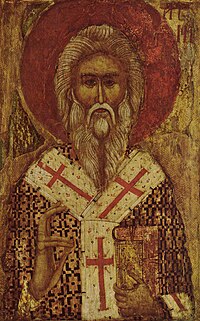Arsenije Sremac (Serbian: Арсеније Сремац, Arsenius the Syrmian; fl. 1219 – 1266) was the second Archbishop of the Serbian Orthodox Church (1233–1263) and a disciple of Saint Sava of Serbia.
Arsenije Sremac | |
|---|---|
 afresco in Visoki Dečani | |
| Church | Serbian Orthodox Church |
| Installed | 1233 |
| Term ended | 1263 |
| Predecessor | Saint Sava |
| Successor | Saint Sava II |
| Personal details | |
| Born | |
| Died | 28 October 1266 Kingdom of Serbia |
| Nationality | Serbian |
| Denomination | Eastern Orthodox Christian |
| Sainthood | |
| Canonized | by Serbian Orthodox Church |
Early life edit
Arsenije was born in the village of Dabar, near Slankamen (today Stari Slankamen), at the time part of the Kingdom of Syrmia (modern Srem, Serbia). The exact date of his birth is unknown. He took monastic vows, probably in St. Demetrius Monastery in today's Sremska Mitrovica. When he heard of St. Sava's work, he was impressed and left for the monastery of Žiča. He soon became St. Sava's disciple and his synkellos.[1] He was appointed as the ecclesiarch of the monastery and later Archimandrite of Žiča, because of his religious life.
When Serbia was invaded by Hungary, St. Sava sent St. Arsenius to find a safer place in the south to establish a new episcopal see. Arsenius chose Peć, where he built a monastery and a church which was at first dedicated to the Holy Apostles, and then to the Lord's Ascension.
Archbishop edit
When St. Sava decided to abdicate, he decided that Arsenije would succeed him. Arsenije was consecrated bishop. He was able to continue in the work of his predecessor. He built Monastery of Peć and participated in the translation of St. Sava's relics from Trnovo to the monastery of Mileševa. St. Arsenije crowned King Stefan Uroš I. He helped King Stefan Uroš I and Queen St. Helene in building the monasteries Sopoćani and Gradac.
He suffered a stroke in 1263, after which he was succeeded by Saint Sava II, nephew of Saint Sava. St. Arsenije died on October 28, 1266.
His relics were buried at the Pech monastery but now rest in the Ždrebaonik monastery in Montenegro. His feast day is celebrated according to the Orthodox liturgical calendar on October 28 (Julian Calendar, i.e. November 10 of the Gregorian Calendar).
References edit
- ^ Mileusnić, Slobodan (1998). Medieval monasteries of Serbia (in Serbian and English). Pravoslavna reč. p. 156. ISBN 978-86-7639-370-1.
See also edit
External links edit
- Repose of St Arsenius, Archbishop of Serbia Orthodox icon and synaxarion